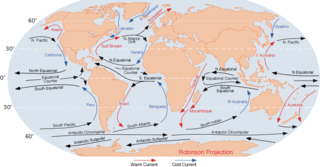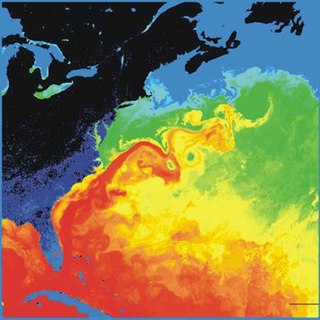
The Atlantic Ocean is the second-largest of the world's five oceans, with an area of about 85,133,000 km2 (32,870,000 sq mi). It covers approximately 17% of Earth's surface and about 24% of its water surface area. It is known to separate the "Old World" of Africa, Europe, and Asia from the "New World" of the Americas in the European perception of the World.

The North Sea lies between Great Britain, Denmark, Norway, Germany, the Netherlands, Belgium and France. An epeiric sea on the European continental shelf, it connects to the Atlantic Ocean through the English Channel in the south and the Norwegian Sea in the north. It is more than 970 kilometres (600 mi) long and 580 kilometres (360 mi) wide, covering 570,000 square kilometres (220,000 sq mi).

The Atlantic Coast Conference (ACC) is a collegiate athletic conference located in the United States. Headquartered in Charlotte, North Carolina, the ACC's fifteen member universities compete in the National Collegiate Athletic Association (NCAA)'s Division I. ACC football teams compete in the NCAA Division I Football Bowl Subdivision. The ACC sponsors competition in twenty-seven sports with many of its member institutions held in high regard nationally. Current members of the conference are: Boston College, Clemson, Duke, Florida State, Georgia Tech, Louisville, Miami, North Carolina, NC State, Notre Dame, Pittsburgh, Syracuse, Virginia, Virginia Tech, and Wake Forest.

The East Coast of the United States, also known as the Eastern Seaboard, the Atlantic Coast, and the Atlantic Seaboard, is the region encompassing the coastline where the Eastern United States meets the Atlantic Ocean.

A subtropical cyclone is a weather system that has some characteristics of both tropical and extratropical cyclones.

The Intracoastal Waterway (ICW) is a 3,000-mile (4,800 km) inland waterway along the Atlantic and Gulf of Mexico coasts of the United States, running from Massachusetts southward along the Atlantic Seaboard and around the southern tip of Florida, then following the Gulf Coast to Brownsville, Texas. Some sections of the waterway consist of natural inlets, saltwater rivers, bays, and sounds, while others are artificial canals. It provides a navigable route along its length without many of the hazards of travel on the open sea.

An ocean current is a continuous, directed movement of seawater generated by a number of forces acting upon the water, including wind, the Coriolis effect, breaking waves, cabbeling, and temperature and salinity differences. Depth contours, shoreline configurations, and interactions with other currents influence a current's direction and strength. Ocean currents are primarily horizontal water movements.

A nor'easter, is a large-scale extratropical cyclone in the western North Atlantic Ocean. The name derives from the direction of the winds that blow from the northeast. The term is commonly used in the winter in New England and Atlantic Canada.

NJ Transit Rail Operations is the rail division of NJ Transit. It operates commuter rail service in New Jersey, with most service centered on transportation to and from New York City, Hoboken, and Newark. NJ Transit also operates rail service in Orange and Rockland counties in New York under contract to Metro-North Railroad. The commuter rail lines saw 45,838,200 riders in 2022, making it the third-busiest commuter railroad in North America and the longest commuter rail system in North America by route length.

The Atlantic Coast Line Railroad was a United States Class I railroad formed in 1900, though predecessor railroads had used the ACL brand since 1871. In 1967, it merged with long-time rival Seaboard Air Line Railroad to form the Seaboard Coast Line Railroad. Much of the original ACL network has been part of CSX Transportation since 1986.

An Atlantic hurricane is a type of tropical cyclone that forms in the Atlantic Ocean primarily between June and November. The terms "hurricane", "typhoon", and "cyclone" can be used interchangeably to describe this weather phenomenon. These storms are rotating, organized systems of clouds and thunderstorms that originate over tropical or subtropical waters and have closed low-level circulation, not to be confused with tornadoes. They form over low pressure systems. In the North Atlantic, central North Pacific, and eastern North Pacific, the term "hurricane" is mainly used, whereas "typhoon" is more commonly used for storms originating in the western North Pacific. The term "cyclone" is used in the South Pacific and Indian Ocean.

In North Carolina, the Crystal Coast is an 85-mile stretch of coastline that extends from the Cape Lookout National Seashore, which includes 56 miles of protected beaches, southwestward to the New River. The Crystal Coast is a popular area with tourists and second-home owners in the summer.

The Atlantic Plain is one of eight distinct physiographic divisions of the contiguious United States. Using the USGS physiographic classification system, the Atlantic Plain division comprises two provinces and six sections. The Coastal Plain province is differentiated from the Continental Shelf province simply based on the portion of the land mass above and below sea level.

The ACC Championship Game is an annual American college football game held in early December by the Atlantic Coast Conference (ACC) each year to determine its football champion. From its inception in 2005 to 2022, the game pit the champion of the Coastal Division against the champion of the Atlantic Division in a game that follows the conclusion of the regular season. The current champions are the Florida State Seminoles.
The Atlantic Coast Conference Athlete of the Year award is given to the male and female athlete who show extraordinary talent throughout the entire season. The award is decided by members of the Atlantic Coast Sports Media Association.
The ACC men's basketball tournament is the conference championship tournament in men's basketball for the Atlantic Coast Conference (ACC). It has been held every year since the ACC's first basketball season concluded in 1954. The ACC tournament is a single-elimination tournament and seeding is based on regular season records. The winner, declared conference champion, receives the conference's automatic bid to the NCAA men's tournament.

The Gulf Stream, together with its northern extension the North Atlantic Drift, is a warm and swift Atlantic ocean current that originates in the Gulf of Mexico and flows through the Straits of Florida and up the eastern coastline of the United States, then veers east near 36°N latitude and moves toward Northwest Europe as the North Atlantic Current. The process of western intensification causes the Gulf Stream to be a northward-accelerating current off the east coast of North America. Around 40°0′N30°0′W, it splits in two, with the northern stream, the North Atlantic Drift, crossing to Northern Europe and the southern stream, the Canary Current, recirculating off West Africa.
The Atlantic Coast Conference honors players and coaches upon the conclusion of each college football season with the following individual honors as voted on by the Atlantic Coast Sports Media Association.















